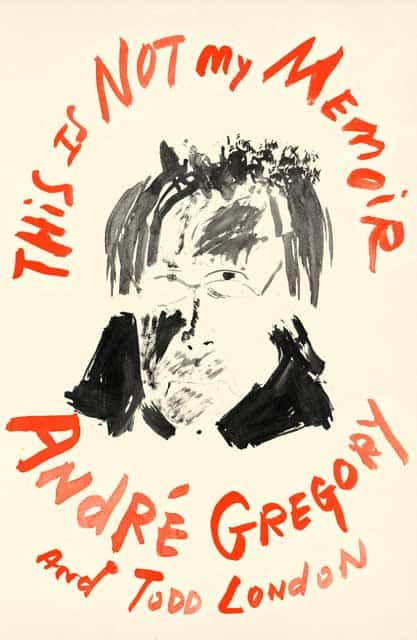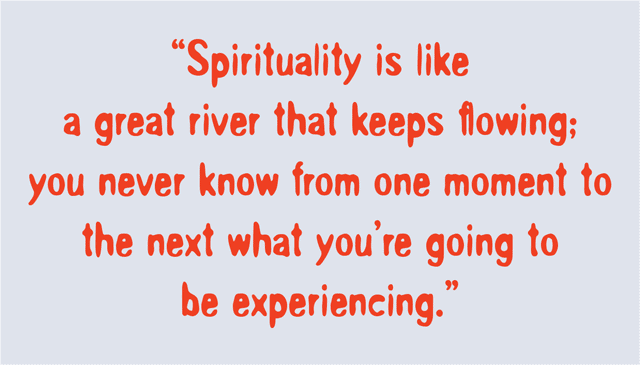by Rebecca M. Alvin
Top Image: Photo: Cindy Kleine
In 1970, six actors under the direction of André Gregory created a groundbreaking stage version of Alice in Wonderland based on Lewis Carroll’s Alice’s Adventures in Wonderland and Through the Looking Glass, with no scenery, no costume or makeup changes, no special effects, no props—only the pure theatricality of actors becoming not only characters but everything needed to tell the story. In his new memoir, This is Not My Memoir, Gregory explains the conceptual underpinnings of his troupe, The Manhattan Project’s legendary production: “Alice was a play about the terrors of childhood made real through the imaginations of a bunch of grown-ups who had never grown up. We were like children who turn over a card table and then totally believe it’s a pirate ship. ‘Look, pirates!’
“We didn’t care about the story. We cared about the elements of Carroll’s books that turned us on. We wanted to make theater about theater, the way action painting is about the event of painting, the way a circus is about the acts. We didn’t ask ourselves what tied the events together until the very end of the rehearsal and creation process, two years in. Even then we found only the most artificial connective tissue between scenes, a tissue that gave the illusion of a story: Alice, a nice, repressed young girl, on the whim of the moment goes down a rabbit hole only to be battered and confused, to have her mind f**ked with by an endless array of sadistic grown-ups.”
It was not only the product of an avant-garde theater troupe in New York; it was a product of its time, something hard to imagine happening with the level of success it garnered then, today.
Reflecting upon the Sixties and Seventies now from his home in Truro, Gregory says although he is aware there are young troupes around the country doing interesting work, he hasn’t personally seen it and it seems that these groups are not part of a larger zeitgeist, as The Manhattan Project was.

“What was unusual about the Sixties and Seventies was that our very far-out work got appreciated by quite a large audience. I think those groups that are working now are pretty much working underground,” he theorizes. “Also, you have periods that are more creative than others. You know, we look back to the 1920s with just an outpouring of visual artists and writers. And then there was that great surge in the Sixties. They come out of nowhere, or seemingly out of nowhere, and then they disappear into nowhere, and you can’t really know why the times are not as thrilling or exciting as they were, artistically.”
The title of Gregory’s memoir, which took six years to write with Todd London, is an ironic reference to his aversion to memoirs in general, a format he had said he’d never work in. But at 86, here he is a memoirist. And yet, the way the book is written, it bears little resemblance to most memoirs. While Gregory discusses his parents, children, and wives, for example, he holds back on personal relationships, never descending into maudlin descriptions of an unhappy childhood or marital strife. Though he says he tends to call his parents “Macbeth and Lady Macbeth,” and in a 2013 documentary about him, André Gregory: Before and After Dinner by his wife Cindy Kleine, Gregory does explore disturbing aspects of his father’s life and possible connection to Nazis, the book is more reserved. Gregory explains, “You know, I didn’t really have any intention when I wrote the book. I just let it come out… I did have difficult parents, but I tried not to dwell too much on it because most of us have had difficult parents or found our childhoods difficult, and you know, I had a roof over my head, to say the least, so I didn’t want to complain.”
What the memoir does offer is an inspiring look at the groundbreaking artist and intellectual who found his tribe with the actors and collaborators of his theater troupe, and later, an enduring connection with playwright and actor Wallace Shawn. Together, they starred in a 1981 film directed by Lous Malle, My Dinner with André, in which they played characters based on themselves in a work that completely blew up the conventions of screenwriting and filmmaking by its seemingly simple construction as a film about a conversation over dinner, with no flashbacks or external scenes—just dialogue. It catapulted Gregory into a semi-mainstream visibility and linked him with Shawn forever.

Gregory’s story, like many people’s, has taken drastic turns, but certain themes continue to pop up in the memoir, such as his relationship to religion and spirituality. He came to the United States in 1939 with his little brother and parents, who were Russian Jews living in Paris at the time, just before the Germans invaded Poland.But upon arriving here in the U.S., his Jewishness was not something to be celebrated, but rather hidden. “I had been what’s humorously called an EpiscoJew. I’d grown up as Episcopalian; my parents didn’t want to be known as Jews,” he explains.
It was only later that he came to explore spirituality, something he says may have come about when his first wife, Chiquita, died of cancer at the age of 56 after more than 30 years of marriage.
“When I was younger, I had no spiritual life at all. I had no interest in it,” Gregory recalls. “And in my forties, I started pursuing Judaism, and I also starting reading a lot of spiritual writing like St. John of the Cross, Teresa of Avila, Ouspensky… and it opened me up to a whole new level of existence, which is the existence of the soul—not the existence of material things that we could see. So I would say I’m spiritual but not religious. Religion has to do very often with dogma and certainty. Spirituality is like a great river that keeps flowing; you never know from one moment to the next what you’re going to be experiencing.”
Related to this search for enlightenment of one kind or another is another recurrent them in the book: searching for teachers and guides throughout his life, whether creatively, intellectually, or spiritually. With age, Gregory says that the search has stopped.
Aging itself is a major theme in the book. “You know, the thing that is wonderful and peculiar about getting older is that you have to become the teacher, and all the teachers are gone. So, it’s not something I’m searching for, although I do feel some of the teachers who’ve been most powerful for me, are still inner guides; they’re still a part of who I am. So I don’t have to sit at their feet learning, but I can learn just from contemplation,” he says. “I guess the need for a teacher has passed. Nature is a teacher now. I sit out on the back porch in Truro and I look out at the beauty of nature, and I’m closer to the Divine.”
Now Gregory paints. He has for about 16 years now, he thinks. It’s a different kind of creative expression than theater, which demands so much of one’s psyche, so much darkness, as most of the great plays are about turmoil, pain, and struggle. And yet, in these times, any art can be a beacon of light in the darkness of our reality. As someone who’s been through a lot and seen so much, Gregory admits this year has been a stunner. Asked if he’s seen any year like 2020, Gregory says, “1939 or 1938, when Hitler was well into power.” But then he adds, “No. I’ve never seen anything like it in this country. I mean the Vietnam War—I was a very active anti-war person—the Vietnam War was a horror, but the nation wasn’t as bad as it is now. And we didn’t, of course, have the virus, so no, I haven’t seen this in this country ever: the anger, the frustration, the civil unrest, the chaos. It’s very disturbing.”
His thoughts, speaking in late September, are focused on getting through the nightmare of these times and hoping for change. “My ultimate message would be vote, vote, vote,” he declares.
This is Not My Memoir may be about Gregory, a singular individual who left his mark on the world of theater and in film, but through his life and growth as a person, now happily married to his second wife of 20 years, and also through the boldness of his creative vision, there appears a glimmer of light at the end of the tunnel. Speaking of himself as a character in the memoir, Gregory says he “changes a lot in the book, goes from being someone who is angry, somewhat aggressive, closed off, to somebody who’s much more loving and connected to the world. So it shows that in spite of everything, we can change.”
Thinking about the future and what he’d still like to do creatively, Gregory says, “I’m doing what I want to do. I’m painting, and I love it. And I do it very seriously…Whether the theater will draw me back or not, I have no idea.” He adds with a laugh, “Of course in these times, we have no idea not only what tomorrow will bring, but whether tomorrow is Sunday or Wednesday.”
This is Not My Memoir (2020, Farrar, Strauss, Giroux) by André Gregory and Todd London is available wherever books are sold. Please support your local bookseller. Visit andregregory.com for information about virtual readings and conversations related to the book.











